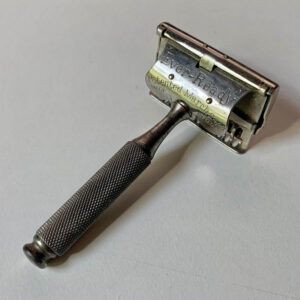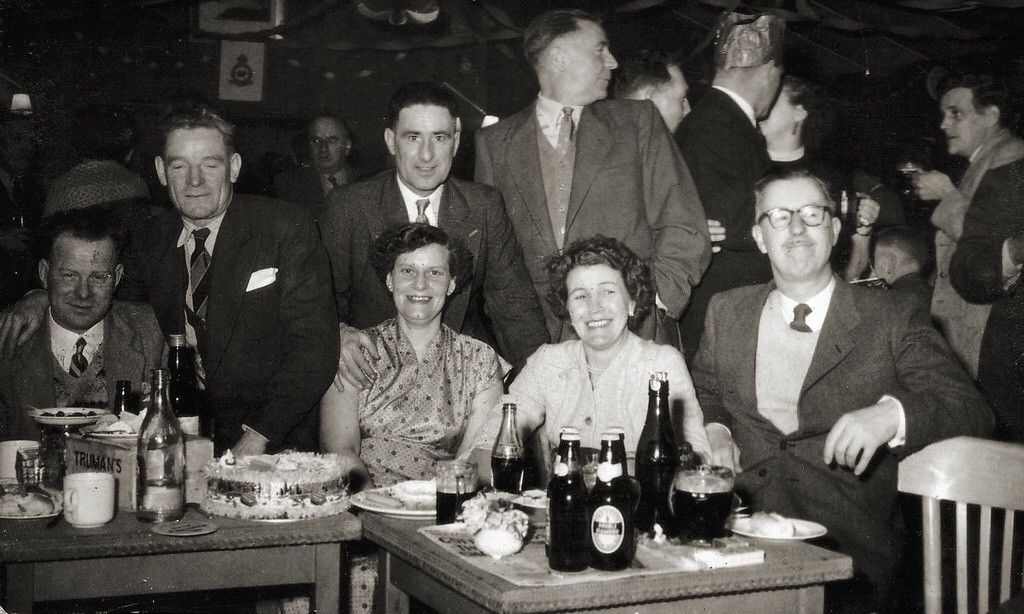I’ve resisted an urge to paint this incomplete picture for a while. I started writing months ago, it would have been my dad’s birthday, that got me thinking about him and about how I’m heading towards the age he was when my mum had me. And I’ve written about my valiant, single-minded, belligerent mum but not about him at all really. The funny thing is I came to realise late that my mum, despite our differences, was a hero of sorts, whereas I grew up convinced my dad was one despite his best efforts to not be in any way connected with what I now suspect he thought was a daft idea. Ultimately he just wanted to grow fruit and veg, eat what he grew and make wine out of what was left, quietly drinking the profits of the excess, enjoy the odd Player’s and read the paper in his chair or pore over the horse racing or football pools, next to the Parkray. Fish and chips on Friday, go to the pub a couple of times a week, that was him. He was quiet – almost silent, funny in a strange way – using voices to express things he found difficult.
Opposites attract, this quietly funny man was almost transparent against the noisy background that was my mum, niftily chaperoning this intense balloon of energy – he stopped her banging into awkward social situations and prevented fights like some unflinching buffer trying to hold back the screeching wheels and sparks of a runaway train. He did so seamlessly, effortlessly, a very quiet, calm mediator. He worked at HMSO in Norwich counting beans and filling in columns in ledgers in the final part of an maybe slightly unexpected career as an accounts clerk for The Stationery Office, at which point I should rewind a bit.
Born in Leyton in 1912, the fifth of seven children. They lived in a modest terrace just off the Leyton High Road which his parents had originally shared with their respective brother and sister Albert and Samuel Stone and Florence and Lizzie Giggins. They had moved from Hoxton out to the ‘new’ estates, the ones we now see as forming part of our everyday ‘old’ inner city picture, that thick band of Victorian housing stock which surrounds so many of our formerly industrialised cities. When Dad was born they still all lived in a little bay-fronted house in Carnarvon Road. His father was a turner; a semi-skilled manual labourer working for British Xylonite in Higham’s Park, Hale End in Walthamstow. Albert was slightly too old to be drafted into the Great War, and so all was present and correct during the years of those years, his tall thin father and rotund little mother, my gran Florence at home, my grandad still working as a toolmaker in a factory famous for producing Ping Pong balls.
He had as far as I can work out a fairly normal life albeit a quite a poor one in one of the poorer parts of London. Left school at fourteen, educated to the extent expected; he was good at maths which resulting in a job as a clerk at the Wanstead Infant Orphan Asylum. At some point he was made unemployed and applied for a a job at Ilford Photographic. He didn’t hear anything back so he gave up and enlisted in the RAF. He was of course going to be a pilot, were it not for his terrible eyesight he might have been. His eyesight, like mine, is so bad they wouldn’t let him near a plane at all. But, he had a job and some sort of future again. Unknown to him, the shadow of the twentieth century authoritarians of Europe were falling long over them. And as the sun rose on into the middle of the century so the shadow shortened.
He met my mum on a double date, a garrulous song-thrush of a girl, she was his pal’s date for the day. In a hammered heartbeat between the shifting beats of the train back from Clacton he whispered to her that he had met the woman he would marry, and in the early Autumn of 1937 he did. They continued in their jobs, her a midwife him an NCO in the RAF and planned ahead as best you can at that sort of age. In late 1939, in that ever shortening shadow from the sun he found out they were to be a parents for the first time.
I have a pile of letters spanning a lot of their time together, from 1937 when they married right up to 1967 when my mum went on ahead to Norwich and he waited in London, subbed off into a records section in the RAF waiting for his last medical, handing back his neatly folded RAF life to the quartermaster before joining the Civil Service. I have his references; solid, a reliable chap, trustworthy, careful.
There is one story in his life as a clerk that stood out as a child, I didn’t and still don’t really know all of it.
I’d heard snatches of tales of the heat of Cyprus, and Aden, and bits about three years at Drigh Road, RAF Karachi away from his wife and children in the mystery of what was then India, he was there for a prolonged period, missed VE day while those at home celebrated, his active war had ended before that anyway, Karachi was safe, they mended planes and played cricket on the beach.
The story that I heard the least was one of France in the summer of 1940. I have two letters, one either side of June. The first from a train to Southampton sent to London in May 1940, missing his pregnant wife, the other is from Lancashire to Cambridge wanting to see his newly born son.
In between the letters he boarded a boat along with the rest of No. 7 A.S.P. Royal Air Force, He was a Flight Sergeant amongst a motley collection of typists, clerks and paymasters, each NCO had a revolver and a a box of bullets issued. The men presumably a pencil. They sailed for France at the beginning of June 1940. To this day I don’t know why, and I don’t think he ever did either, the story is hazy. They disembarked at Le Havre and boarded a train for either Amiens or Nancy. At the same moment, most of the BEF were trying to go in the other direction travelling North of the German thrust through the Low Countries and across the north of France, the slash that cut across Europe before swinging down like a jaw closing over Paris, and they were underneath it.
I remember the story from snatches of conversation I overheard in the pub on a Sunday lunchtime. I was in my early to mid-teens. My sister and her husband would come over every few weeks for Sunday dinner, we’d end up in the pub. By the time I was 15 I was allowed a pint, and used to drift away with a pocketful of change to the Space Invaders or Galaxians machine, usually just within earshot of any conversations between them and the barman who they knew. They usually sat at the bar – a habit I’ve stuck with whenever I can; some of the best stories live between that wood and the people perched there. The conversation rolled onto the war. My brother-in-law’s dad George was a POW in the Far-East, he’d been in Changi, my uncle Alf was there too; there was common ground between them and as the beer flowed. My usually quiet dad opened up and started to talk about his experiences.
They disembarked from the train – Liverpool Street it wasn’t, they got out of the carriages fast and found themselves in the middle of a Stuka attack on the yards*. The officers ordered the men out of the train and as a mass they were told as they crouched for cover by a wall that there had been a terrible mistake, the ship should have been turned about and returned to port and taken them straight back. Each NCO was to take six men and make their way to the coast. They had one revolver between them and no food. He was apparently the first man to stand up. Who’s with me? At that moment the Stuka’s started to come round again. An officer told them all to move fast; behind the wall an ammunition dump lurked, the target along with the trains of this aerial spite. Dad took his charges, men like him, and they started to run as fast as they could away from the yards.
It appears the roads were busy, floods of refugees, and a large contingent of airmen, ground crew, and artillery men trying to get to the coastal ports of Normandy and Brittany, nearly two hundred thousand of them. It what was to became unknown as Operations Cycle and Aerial. Ultimately it was nearly as big a human effort to escape from the grip of the German army on the neck of France as Operation Dynamo had been, with over 190,000 people evacuated.
I don’t know much really. There is more written about the sinking of the Lancastria which happened during that evacuation than about any of the rest of the whole debacle. To fulfil the trope, my dad didn’t say much more. All I overheard and later had recounted by mum was this. They walked for days, tried to hitch a lift. An ambulance already packed with men stopped and told them they were going the wrong way. They slept when and where they could and ate what they found, raw potatoes, roots from fields, eggs, animal feed, scrounged rations. They were bombed. He was lifted into the air by the impact and force of an explosion, and was thrown with several of the men into a pond, I don’t know where*, but the mud was red, I always remember the mud was red. They forced themselves down into its protective softness. My dad shouted over the din to the boy next to him, one of his charge, his men. ‘Roll over mate, you’ll catch one’. He was already dead, his stomach torn open. They had walked for days and nights, slept in sheds and barns. Eventually they reached Brest in Brittany by a combination of luck, lifts and feet. Wearily stood in line in filthy encrusted RAF blues they eventually boarded the boat together, crammed on to the deck in their hundreds, all exhausted. A feeling of relative safety on the last leg of the slow trip back through the minefields, an image repeated along the coast from Normandy to the border with Spain.
There is one thing we have, hidden until recently in a drawer, it’s an old fashioned screw-topped safety razor, it packs flat, made from stainless steel, a rough handle patterned coarsely for grip in soapy hands. It sat in our dark bathroom for my whole childhood, unused, a spare. He had a modern razor he used daily except weekends when his hair was washed clean of hair oil and went wild, and he grew a two-day stubble before the Monday morning shave for work.
Only a year or so after I’d stumbled into the world of having to shave with any regularity, he died. It wasn’t that long after the overheard conversation in the pub, a year, perhaps two. The house, their first, was bought in their fifties. It wasn’t big, three bedrooms, a living room, dining room and kitchen and the little bathroom. My mum decided it was too big for her on her own, too forlorn and in need of repair for her to continue living in with any ease. So she prepared to move. I was eighteen, at college, living in a damp wreck of a house in Norwich. At weekends I wound my way home to be fed and use the dark but clean bathroom. We cleared the house of what seemed at the time like a rather bleak tidal detritus, a 40 years watermark, stopped dead at the high point of their lives, finally together, as at peace with life as anyone ever is.
 As we sifted through paper, clothes, old photos, and personal effects she handed me the small rather bent razor, and with it she told me of the significance it held. It was one of the only two things she had left that had travelled with him through the war – a watch, which she had worn since he died, and this razor. He had carried it across France, to India in 1943 and on. It had been used daily, and on that boat across the grey wide shoulder of sea back towards Portsmouth, he used it, then it had been passed from man to man on the deck to scrape the past few days or weeks beards, muck and the human passage of time away – every face a story in itself.
As we sifted through paper, clothes, old photos, and personal effects she handed me the small rather bent razor, and with it she told me of the significance it held. It was one of the only two things she had left that had travelled with him through the war – a watch, which she had worn since he died, and this razor. He had carried it across France, to India in 1943 and on. It had been used daily, and on that boat across the grey wide shoulder of sea back towards Portsmouth, he used it, then it had been passed from man to man on the deck to scrape the past few days or weeks beards, muck and the human passage of time away – every face a story in itself.
I believe he ended up at RAF Halton within a large contingent of tired, filthy, and variously broken men. They were fed, slept on hospital cots in their thousands, were sent to the M.O., asked if they felt okay and told to strip. This was the first time he’d removed the mud stiffened and reddened uniform in two weeks. He was okay but had a bruise that stretched down one side of his body from heel to shoulder, the side he had landed on when he had been blown into the pond. My mum said he told her it took three baths to get the ground in filth off, turning the water red.
I don’t know exactly why the men and women who experienced the war the way he did didn’t talk about it. But then we come from an age where a lot of us share every experience in so many public ways. Maybe when a generation experiences something as they did together; where everyone knows that everyone else has a story, has seen hardship, experienced death, had to fight or run. There is little need to share the experiences. Maybe it is easier and more comfortable to just forget. Perhaps he saved it for the pub with his pals, as the time pulled out into years, the stories surface, rising up from us.
Warrant Officer Charles Stone 1912 – 1983.
Top: Charles and Margaret Stone, Clacton 1939.
Below: Christmas 1950.
*I now believe this might have been at the end of their journey through France and happened at the marshalling yard and station at Renne. On the 17th June 1940 there was a huge dive-bomber attack on the bottleneck in the transportation system, many trains including a munitions train were hit which is consistent with some of my memories of the story – memories are fragile, so I’ll probably never know for sure. But, some 800 French, Indian, and British service people and civilians died. What the people who saw there is beyond belief. There are a few links to first person accounts and records on the BBC website.
https://www.bbc.co.uk/history/ww2peopleswar/stories/88/a7500188.shtml
https://www.bbc.co.uk/history/ww2peopleswar/stories/80/a3610180.shtml



Lovely! He would have been proud.
Beautifully written – I take it you were acquainted with Charles, Reg?
Always amazes me how internet paths cross & recross… I came to Nick’s blog via a retweet on Twitter.
Thanks both of you. There was a curious moment a couple of years ago where reg and I stood in a room in the battered hull of HMSO and he pointed out where my dad had sat.
‘In a hammered heartbeat between the shifting beats of the train back from Clacton he whispered to her that he had met the woman he would marry.’ What an absolutely beautiful, evocative line. Pure class. Lovely words and wonderful pics.
I don’t know how I managed to miss this Nick but am so glad I saw the link. It’s a beautifully written piece of work and captures our dad beautifully. I am sitting crying into my coffee. Don’t stop writing such good stuff.
Moving without being (or perhaps because not) sentimental – great stuff, Nick.
This is just lovely Nick.
Thank you for sharing such intimate and heart-rending stuff.
Just lovely.
Beautiful work Nick.
As l understand it from old (and new) soldiers, they only talk to people who understand. Other soldiers.
The only scant information we got from my Dad and Grandad, was after a few pints were inside them.
Very fond memories of your dad, Nick. Loved my Sunday lunchtime beers with him in North Walsham. Always a treat.